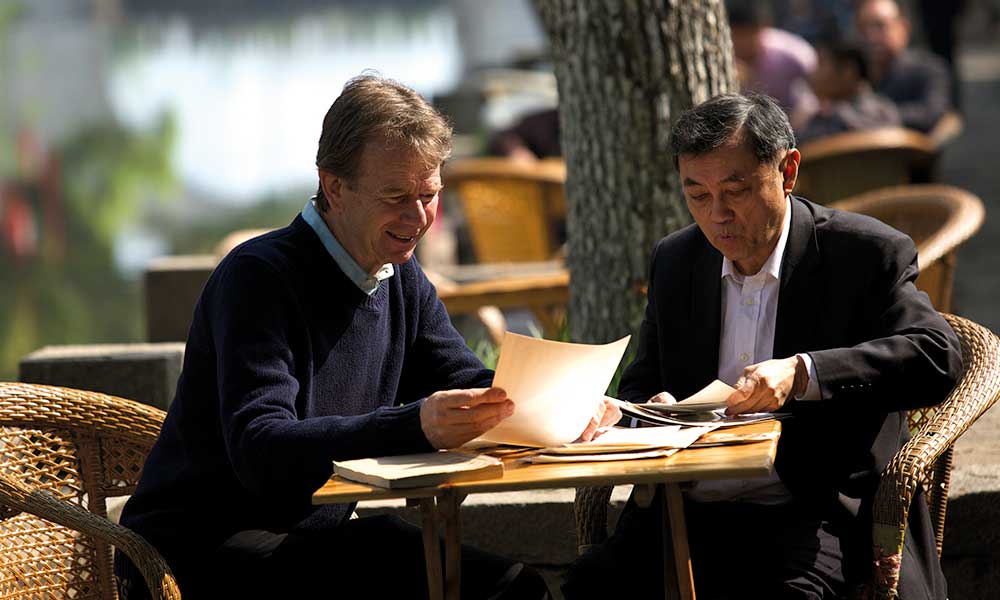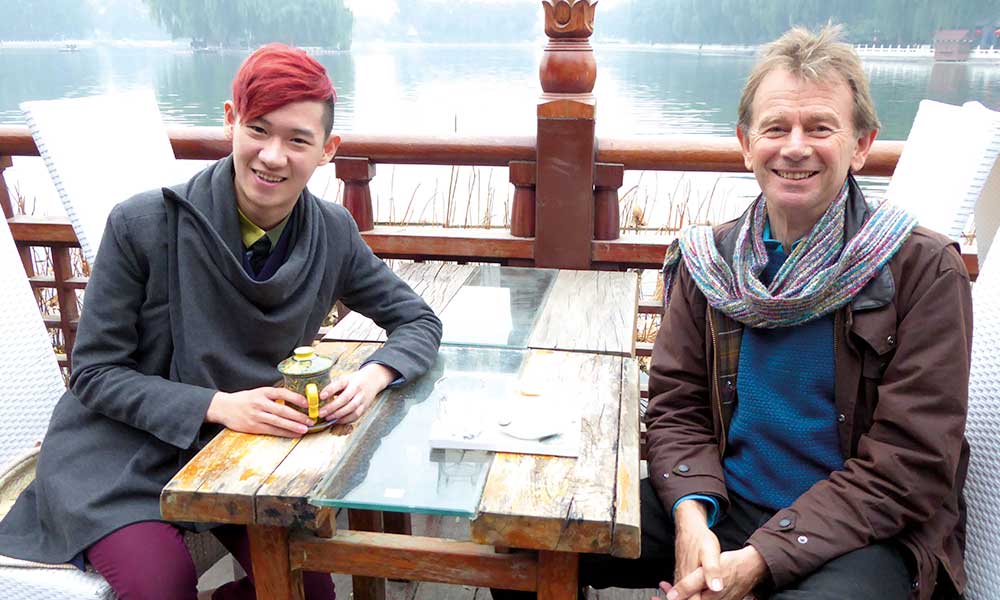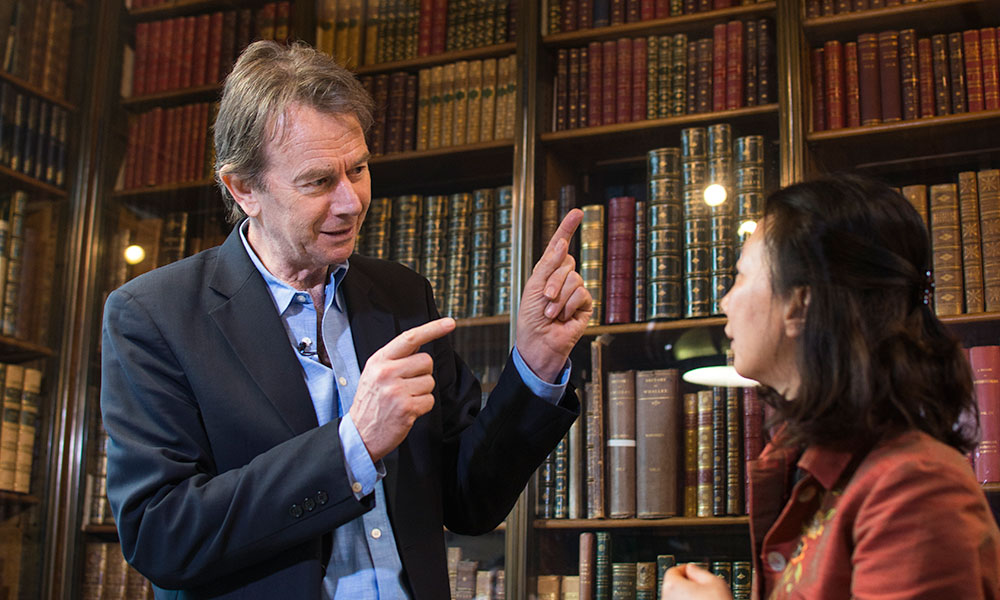Professor of Public History Michael Wood takes us inside the international success of his recent BBC series, The Story of China, and contemplates his own love affair with the past.
Michael Wood is many things – filmmaker, author, TV presenter, Professor of Public History – and his work has entertained people around the world. He has brought the annals of history alive, from Ancient Greece to India, Anglo-Saxon Britain and, most recently, China, in a BBC six-parter that won plaudits in the Far East and at home.
To borrow a lyric from Tangled Up in Blue – by Bob Dylan, one of his musical heroes – Professor Wood is "still on the road". And despite pleas from his elderly mum, his zest for adventure, filmmaking and the past show no sign of abating.
"History is a reality check," he explains. "It tells you who you are and where you are."
It's in China that Professor Wood has found himself for much of the past two years, making 12 visits to capture The Story of China – a TV chronicle of the world's newest superpower, told in his trademark warm and empathetic style of storytelling.
History is a reality check. It tells you who you are and where you are.
"To me, empathy is a very, very important word. It's an important word in making films; it's an essential quality of being a historian," he says.
China's real heroes
He set out to offer a counterbalance to some mainstream western narratives on China by showing its real heroes – its people. The series gained an overwhelmingly positive response from the public in Britain and in China, where it drew in up to one million viewers per episode on pirate websites. From a TV career spanning 110 documentaries, he says more strangers approached him about this than any other.

Talking to Frank Ching about his ancestors by the canal, Wuxi.
The series was commissioned by the BBC and American broadcasters in 2008, following the success of 2007's The Story of India, but work didn't start for another five years due to a string of other filming commitments. Cramming China's past – and present – into six hours was no easy feat, explains Professor Wood, author of popular non-fiction books on topics from the Dark Ages to Shakespeare, and Professor of Public History at the University since 2013.
He says: "You can't just do a string of emperors, so what we set out to do was go down to village level, to involve the Chinese people. China's not a culture that people know much about in the west and it's not a culture that, in my experience, people feel that warm towards. People think the Chinese people are difficult to get to know, but from my first experience in China, back in the 1980s, I came away with a real sense of how hospitable and sociable they are.

Talking to Wilson Wei about the Dream of the Red Chamber
"On the first day, I told the team doing this series: 'One of the most important things for us to convey is the sense of warmth and fun of the Chinese people'."
People and history go hand-in-hand for Professor Wood – who is, during our interview, taking a lunch break in the University's Christie's Bistro, attempting to regain some of the pounds he unintentionally shed during two years of 'clean' Chinese eating. He says: "I've done stories of kings and queens, and stories of peasants, but history is about people. Stories are what make history tick."
They're also what brings Professor Wood to exuberant life as he recalls the with stories of the people he has met along the way: the couple that he and wife Rebecca (MD of their independent Maya Vision production company) met at a south-Indian temple 30 years ago, and who inspired his book A South Indian Journey; the Greek family they stay with for holidays; the Chinese family who featured in episode 3 of the BBC series, unfurling a magnificently long painting of their family lineage, sensationally rescued from the Taiping rebellion of the 1850s and buried during Mao's cultural revolution.
"It's one of the wonderful things about the job. The idea that you're welcome into a household or family, that you could sit in a stifling hot room in the south of India and feel this electric current, this voice from history – it's just an amazing privilege and I've always loved that," he explains. You really learn things when you just listen to people and see their way of life."
Family history
Episode 1 of The Story of China saw Professor Wood join the Qin family in Wuxi – a family he first encountered in a book given to him by a friend in the 1990s, and whose story he knew would make great viewing one day. He connected with them via email and, several months later, was among 300 of them at an ancestry festival to honour their family history.
Family history is where Professor Wood's own fascination with the past started, specifically his relatives' roles in World War II. "My uncle Sid was torpedoed and sunk in the middle of the Mediterranean and swam through burning oil; Dad was in the hospital at Haslar on D-Day looking after the dead and the dying; Mum was caught in the blitz in the middle of Manchester and sheltered in a doorway all night. These are just the stories of one family," he reveals.

Professor Wood with Professor Yang-Wen Zheng at the John Rylands Research Institute and Library
His interest was captured further as a schoolboy at Manchester Grammar School, where he was given an impromptu lesson in Manchester's rich and radical past on his first day.
In the oldest traditions of the BBC, Professor Wood sees his work as a public service, and it is the enthusiasm that he inspires in young history-lovers that spurs him on. He shares an anecdote of a red-haired high-school girl who approached him with excitement about his series In Search of the Trojan War, declaring she would one day be an archaeologist after watching the show. He met that red-haired archaeologist ten years later on a dig at Troy.
"For young kids, history is telling good stories," he says. "For older kids, it's helping to start situating you in a wider world. I think it gives meaning to the present and it gives value. To say that history is not relevant is a real mistake."
Many years on from the start of his own love affair with the past, Professor Wood – filmmaker, author, TV presenter, professor – is "still on the road" and still learning. "Curiosity is a great thing," he says. "It takes you a long way."
